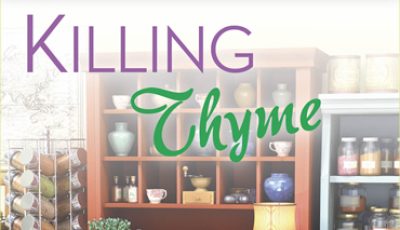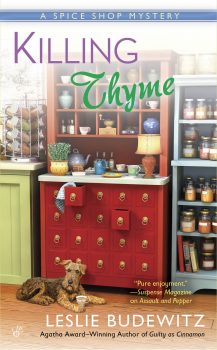

Killing Thyme by Leslie Budewitz
 By Wendy Tyson
By Wendy Tyson
Leslie Budewitz cooks up a tantalizing mystery with her latest in the Spice Shop series, KILLING THYME. Set in Seattle’s lush Pike Place Market, KILLING THYME is a feast for the senses—with a murderous twist. Spice Shop owner and amateur sleuth Pepper Reece discovers that a Market newbie is a friend who disappeared years ago. When this friend is murdered days later, Pepper is determined to find the killer, only her search for the truth could have deadly consequences.
Leslie recently sat down with The Big Thrill to chat about the cozy genre, the marriage of food and fiction, and her (excellent!) advice for aspiring authors.
Congratulations on the upcoming release of KILLING THYME, the third of the Spice Shop mysteries, a series Suspense Magazine calls “Pure enjoyment.” Please tell us something about KILLING THYME that is not on the back cover.
Readers will learn about salt pigs, art cars, ghost nets, and a troubled time in Seattle’s history. They’ll discover a dozen new recipes using thyme, and find out Pepper’s real name.
Setting is an important aspect of your novels. You write another popular series, the Food Lovers’ Village Mysteries, set in a fictional town in your home state of Montana. The Spice Shop Mysteries, on the other hand, are set in Seattle. Why did you choose big-city Seattle? What have been the challenges of choosing a real-life locale as the backdrop for your books?
The urban cozy is less common than its small-town sibling, but I love exploring a city through the cozy lens, because to me, the focus of a cozy is the community. Cities all have communities within the community, and the Pike Place Market is the perfect example. Imagine a year-round farmers’ market, 200 artists and craftspeople who rent day stalls, 200 owner-operated shops and services, and 100 restaurants, plus 350 residents—all on nine acres. The Market is a microcosm of Seattle, as well as its stomach and a key part of its history and landscape. I fell in love with the Market and the city as a college student nearly 40 years ago, and when I decided to start a second series, it seemed perfect.
A city is always changing. Readers know, or think they know, the place from their experience. But your city and mine may be different. As an example, Big Bertha is still tunneling underneath the waterfront for a new highway—and no one really knows when, or if, it will be finished. The Market’s new south entrance is being built—I’m looking forward to seeing it in October when I head to Seattle on a book tour. So I have to be selective about what real shops and sights I include, and focus on conveying the character and energy of the city. And my love for it.
The Spice Shop mysteries, like your Food Lovers’ Village novels, are charming, engaging whodunits with a dash of humor. Although they deal with murder, they’re cozies—not hard boiled crime novels. What has drawn you to the cozy genre?
First, the cozy is just plain fun. And it’s a great avenue for exploring character and setting. The heart of the cozy really is the community. The amateur sleuth uses her knowledge of the people and place to investigate in ways that the law enforcement can’t. We need both that official investigation, to obtain legal justice, and the unofficial investigation, to restore the social order, disrupted by the crime. To restore the community. And of course, to feed it.
The cozy is a bigger tent than some readers realize. I call my Spice Shop Mysteries “social justice cozies,” because underneath the food and fun, each explores a social issue. In KILLING THYME, the present-day crime reveals tensions in the past that have deeply influenced Pepper, without her conscious awareness—we are all affected by similar influences, though not typically criminal ones! In these first three books, personal identity is also a major theme. We are all shaped not just by our families and communities, but by our choices, good and bad. We all play many roles in our lives, and they often change. That question of identity intrigues me, and it’s been interesting to explore it through fiction.
Food and the culinary arts play a central role in both of your mystery series. In addition to writing about food in your novels, you feature recipes on your website, and you have co-authored cookbooks such as The Cozy Cookbook. Is cooking a passion for you? What is it about food that lends itself to murder mysteries? It seems like an unlikely pairing, but it works—why?
I have to disagree with your comment that food and mysteries are an unlikely pairing. One reason we love mysteries is that ultimately—in all subgenres, except noir—justice prevails and the sense of order is restored. What does that better than food? It’s the ultimate symbol and source of community. Recipes are also windows into culture and history, other passions of mine.
One of the pleasures of adulthood, for me, has been discovering good food and drink and learning to cook. I did not grow up in a foodie family, but I credit a few friends and those hours exploring the Pike Place Market, first as a college student and later as a young lawyer, with igniting the passion. My husband and I cook together, and we love few things more than finding new restaurants or cooking up something new in the remodeled kitchen we designed ourselves.
Readers who enjoy the intersection of food and fiction are invited to stop by the Mystery Lovers’ Kitchen, where ten authors and our weekly guests cook up crime and recipes!
You’re a lawyer who has published an award-winning nonfiction book titled Books, Crooks and Counselors: How to Write Accurately about Criminal Law and Courtroom Procedure—and the first author to win an Agatha Award for both fiction and nonfiction. How did you go from lawyer to mystery novelist?
One day in the law library, inspiration struck! Seriously, like many authors, I’d wanted to write since I was small, but I didn’t know any authors—even though I worked in a bookstore as a teenager—and thought I needed a real job! It’s been a good one, feeding me and my fiction, but at a certain age, if you’ve got the urge to create, it must out. So I started writing fiction, and along the way, began answering other writers’ questions about the law. That led to newsletter articles, then to the book. But as much as I love helping other writers get the facts right, I realized that mystery wasn’t through with me, so I turned back to telling my own stories.
And I will tell you, writing novels is the best job I’ve ever had!
Do you have a favorite spot from which to write?
I’m blessed with a lovely home office, filled with art and inspiration—and the stunning Montana landscape outside my windows.
Any advice for new authors?
Read, write, repeat. Learn to read like a writer—Reading Like a Writer by Francine Prose is a great guide. Outline some of your favorites, to develop an understanding of pace and plot as well as style. Study the genres—they aren’t categories imposed by publishers and booksellers to confine writers, but are based on the visceral elements of story, on readers’ expectations. Learn about the business, but keep the horse in front of the cart. Ultimately writing is a journey you take with your reader—you at your desk, she in her easy chair as you transport her to a time and a place, a situation, with a cast of characters, that she can understand in her heart and her body, even if she knows nothing about the world you’ve created until turning the first page. It’s a sacred trust, worthy of our deepest efforts and intentions.
What’s next for you, Leslie? Can readers look forward to a new Spice Shop mystery?
Watch for TREBLE AT THE JAM FEST, the 4th Food Lovers’ Village Mystery, in June 2017. As for the Spice Shop, I dearly hope to take my readers back to Seattle, and am headed out to the Emerald City shortly for a book launch and research trip. By research, of course, I mean eat. Meanwhile, I’m working on a very different crime novel and hope to have news for readers soon.
Thanks so much for the conversation!
*****
 Leslie Budewitz blends her passion for food, great mysteries, and the Northwest in two light-hearted mystery series. Suspense Magazine calls Assault and Pepper, first in the Seattle Spice Shop Mysteries, “the perfect recipe for a few hours of pure enjoyment” and “a first-rate story.” New York Times bestseller Laura Childs says of Leslie’s Food Lovers Village Mysteries, set in Jewel Bay, Montana, “Small town charm and big time chills.” Death al Dente, the first Food Lovers’ Village mystery, won the 2013 Agatha Award for Best First Novel.
Leslie Budewitz blends her passion for food, great mysteries, and the Northwest in two light-hearted mystery series. Suspense Magazine calls Assault and Pepper, first in the Seattle Spice Shop Mysteries, “the perfect recipe for a few hours of pure enjoyment” and “a first-rate story.” New York Times bestseller Laura Childs says of Leslie’s Food Lovers Village Mysteries, set in Jewel Bay, Montana, “Small town charm and big time chills.” Death al Dente, the first Food Lovers’ Village mystery, won the 2013 Agatha Award for Best First Novel.
Leslie is also a lawyer. Her guide for writers, Books, Crooks & Counselors: How to Write Accurately About Criminal Law and Courtroom Procedure, won the 2011 Agatha Award for Best Nonfiction, making her the first author to win Agatha Awards for both fiction and nonfiction.
Leslie’s short stories have been published in Ellery Queen, Alfred Hitchcock, and elsewhere, and recognized in Best American Mystery Stories of 2009. She is president of Sisters in Crime.
A native Montanan, she lives outside Bigfork, at the foot of the Swan Mountains, with her husband, a musician and doctor of natural medicine, and their Burmese cat, a book cover model and avid birdwatcher.
To learn more about Leslie, please visit her website.
- Up Close: Tosca Lee and Marcus Brotherton - May 2, 2023
- Up Close: J. T. Ellison - February 28, 2023
- Up Close: J. J. Hensley - September 30, 2020
